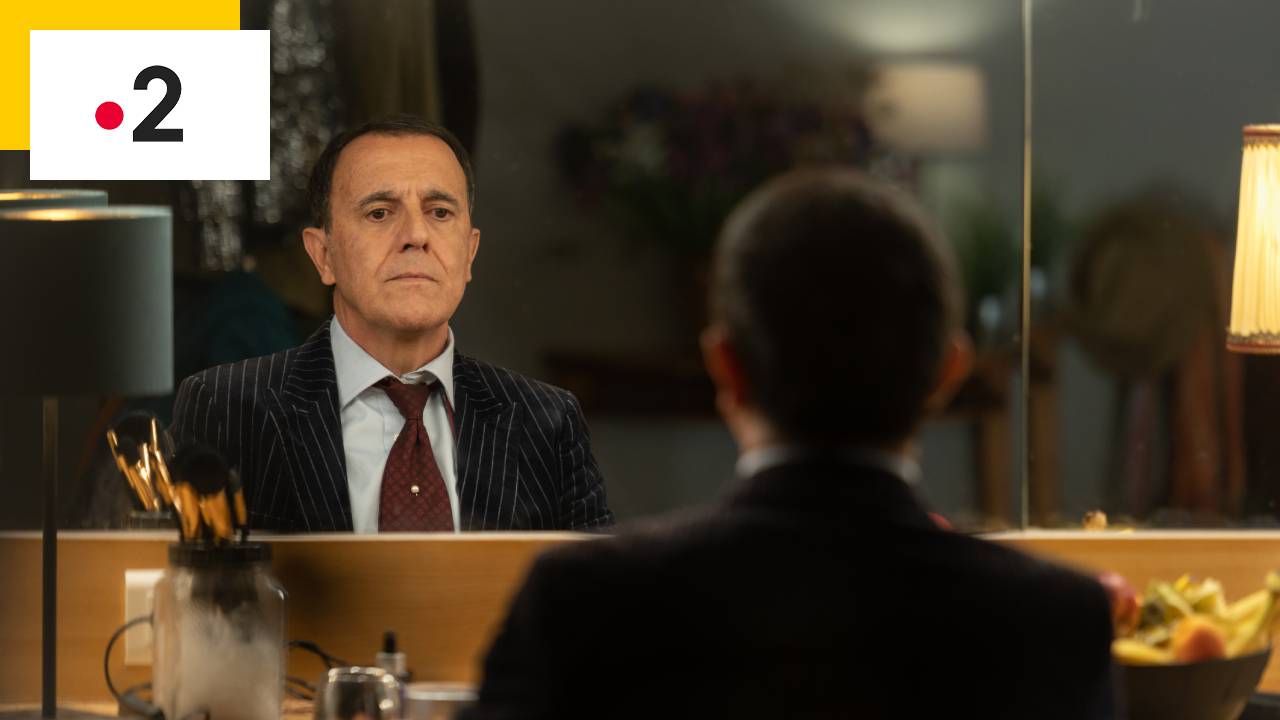This Wednesday evening, France 2 is dedicating a special evening to abused children, with, at 9:10 p.m., “I was born at 17”. We tell you what we thought of this new TV film with Thierry Beccaro, Elsa Lunghini and Moïse Santamaria.
What is it about ?
I was born at 17 is the adaptation of the eponymous autobiography by TV host and actor Thierry Beccaro.
The TV film tells the story of Thierry (Thierry Beccaro), a former child beaten by his father who is now an adult but who retains anxiety and a perpetual lack of self-confidence from that time. The announcement of the imminent death of his father (Moïse Santamaria), with whom Thierry cut ties many years ago, instantly makes him plunge back into his childhood traumas. Thierry then wants to turn this page of his life once and for all. But that’s easier said than done…
Who is it with?
To play the main role, I was born at 17 called on Thierry Beccaro himself.
Among the other headliners of the TV film, we find Moïse Santamaria (Manu Leoni in Un si grand soleil since 2018), who plays Thierry’s father here, or Elsa Lunghini (Clotilde Armand in Here Everything Begins since 2020), who plays, in this TV film, Laurence, Thierry’s partner and the mother of his two children.
Also present in the cast: Elisabeth Commelin, alias Yolande Sandré in Plus belle la vie, and Muriel Combeau, long seen in Avocats & Associés, Fais pas ci, fait pas ça, Doc Martin, and Nina.
It’s worth checking out ?
The France 2 audience probably already thought they knew Thierry Beccaro well, he who was the presenter of the famous TV game Motus broadcast almost every day between 1990 and 2019 on the channel. However, he is probably not ready to discover the painful childhood that the presenter experienced, made up of school bullying (because he was considered too top of the class for the tastes of certain classmates) and intra-family violence (for more than ten years by his father).
At first glance, the presence of Thierry Beccaro in the distribution of the TV film can be disturbing. There is no question here of witnessing an unhealthy reconstruction of the traumatic events of his childhood: other actors, Pierre Azzarello, Thomas Kroon and Jules Morlon, take on the role very well of playing Thierry as a child, then as a teenager.
Quite simply, few people are interested in playing their role in a fiction inspired by their own life. Plus, writing down what you’ve experienced is one thing, but saying it out loud is another. Thus, the extreme sincerity of Thierry Beccaro’s interpretation, particularly during scenes which relate particularly intimate moments in his story, makes it all the more touching.
Special mention, in passing, to Moïse Santamaria, impressive and disturbing in the role of Thierry’s father, a man who is at once violent, alcoholic, envious, symbolically emasculated by society and possessive.
I was born at 17 succeeds in distinguishing itself from other series or TV films devoted to domestic or intra-family violence due to the narration adopted by the TV film, the plot of which is centered on the consequences of violence on battered children. Here, there is no chronological story which would begin with the first acts of violence or with the first signals spotted by a loved one, and which would conclude with the incapacitation of the aggressor and the beginnings of the reconstruction of the victim.
In I was born at 17, the action takes place in the present, with an adult character who, following an event which brings him back to his past, from which he has not completely turned the page, confronts his loved ones with their attitude towards violence committed by his father, which we discover through flashbacks. Disagreements and misunderstandings exist, but there is no taboo to break here.
I Was Born at 17 also opposes a Manichean conception of the world, emphasizing the complexity of situations and human reactions, even when it concerns stories of domestic or intra-family violence. It is therefore interesting to note that no character here has the same view of the violence inflicted on Thierry, whether Thierry himself, his sister, his mother or his aunt.
Several characters even see their position change over the course of the TV film. If all points of view are not put on the same level, they are, nevertheless, heard without being directly discredited, so as to try to understand, without necessarily relativizing or justifying a point of view or an act.
It is up to the public to assess whether this or that character in Thierry’s entourage showed himself to be powerless or indifferent in the face of the violence inflicted on Thierry by his father.
Clear, I was born at 17 is a touching fiction and a pleasant surprise to discover this Wednesday, November 22 at 9:10 p.m. on France 2, on the occasion of a special evening dedicated to abused children for International Children’s Rights Day. Please note: the TV film will be followed, at 10:40 p.m., by a debate, notably in the presence of Thierry Beccaro, on the theme “Mistreated children: rebuilding oneself after violence”.
